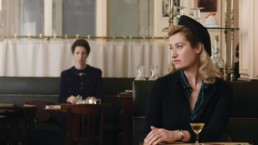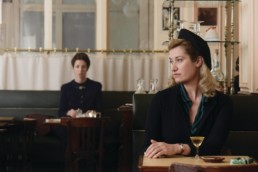Review: ‘Violette’
For those interested history, the roots of feminism, or who just want to enjoy an expertly crafted film, Violette is not to be missed.
Violette is the beautiful and heartbreaking story of a real woman who became a great writer. Throughout the film we witness her search for what it means to be a woman, we see her learn to value herself and become a truly independent woman in a way most of her contemporaries are unaware is possible.
Violette is a beautiful film about a real life contemporary of Simone de Beauvoir named Violette Leduc. Violette (Emmanuelle Devos) is a sort of tortured artist, roaming through her life searching for meaning, purpose and above all, love. She is often times violently unhappy and she is almost always the cause of her own unhappiness. She throws herself at men and women who will not love her and she never understands why they will not (it is usually because the men are gay or the women are not). Violette is a woman before her time and equally a product of her time; she is a sexually liberated woman who has the ability to love anyone or perhaps she lacks the ability not to love them. She is also undervalued, taken advantage of and dismissed because she is a woman and a bisexual and earlier in her life because she is a bastard. She has always known society rejects her for things she cannot help. It never once occurs to her not to be who she is, which makes her a truly admirable character.
For all her faults Violette is an extremely likeable character, she feels her emotions with full force and without inhibitions.
As the film unfolds we see Violette’s circumstances change from a black market meat seller to the writer we know she eventually becomes, but her journey is torture to her. Each book she writes and friend she makes becomes a source of deep anguish for her as we watch her use the same tactics with different potential lovers and see them fail each time. She is unyielding in her search for affection and unwavering in the ways she professes her love; almost everyone she tries to love literally turns and runs from her advances. And when she finds someone new to try to love we root that this time might be the time her advances succeed. For all her faults Violette is an extremely likeable character, she feels her emotions with full force and without inhibitions.
Almost every frame in this film could be paused and create a breathtaking photograph, the use of color is unexpected and utterly beautiful. The film is dark like many post WWII era films are, but each shot contains some piece of bold color. Each location, camera angle, costume and set decoration pulls the audience into the time of the movie and makes you believe that it was more beautiful and brutal a time than you could have ever imagined. This film is perfectly constructed and deep meaning is embedded into each shot. For fans of history, or people interested in the roots of feminism and equal rights for women, or people who enjoy a movie expertly crafted, this film is not to be missed.


